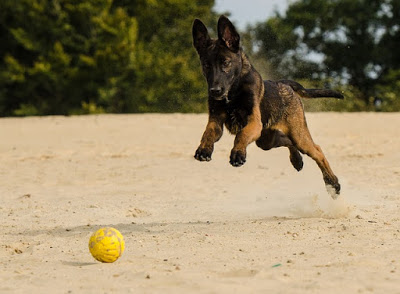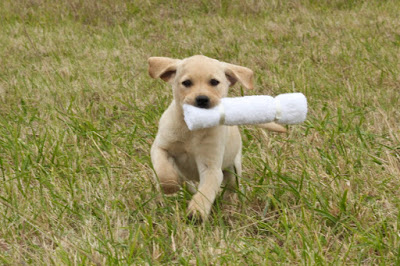Dogs
Guest post by: Jamie Fratkin, PhD
First off, I just wanted to say that I love reading your blog! ('THANK You!' say Mia and Julie). I think it’s such a great platform to deliver the latest in dog research for both researchers and dog lovers, and I am excited to be able to contribute.
Just as a bit of background on me. I just finished my PhD in Social/Personality Psychology at the University of Texas at Austin, working with Sam Gosling. My research focus has been examining personality in dogs as well as examining relationships between dogs and people. The project I’ll be talking about is one that I started in my first year of grad school.
The idea for the project was prompted by a practical question in the context of working dogs. Numbers vary a bit depending on the organization, but only about 50% of the dogs trained and bred for working-dog roles end up succeeding or actually working in the roles they were bred for. Lots of money and time is spent raising and training these dogs and with so few dogs succeeding, it is important to determine the factors that might influence success. If we can find these factors we may be able to train more successful dogs or at least figure out at an early age which puppies are most likely to succeed.

Many studies have begun to explore the role of personality in working-dog success (e.g., Duffy & Serpell, 2012; Goddard & Beilharz, 1982, Sinn, Gosling, & Hilliard, 2010). Just as not every person is suitable for every job, not every dog is suitable for every working role. For example, you don’t want a dog that is afraid of traffic to lead a visually impaired person. You also don’t want a dog that is easily distracted to be in charge of detecting explosive devices.
Research suggests that some traits seem to be particularly relevant to a dog’s working success. For example, in the 80s, Goddard & Beilharz conducted a series of studies examining guide dogs in Australia and found low fearfulness was a significant predictor of success.
These other studies are promising but there is practical obstacle to doing them. That is, most experts from working dog organizations are already pressed for time by all of the responsibilities they have to oversee. So they usually don’t have time to undertake the behavioral observations that are key to systematically assessing dogs’ personalities.
So for this study, we wanted to find out whether we could save the experts’ time by having non-experts rate the dog’s assessments instead of the experts. We examined this question in two assessment contexts. One context consisted of Belgian Malinois puppies undertaking a short, very standardized test; dogs were placed in a room and the assessors went through a series of standardized steps to examine the dog’s reactions to various stimuli such as a vacuum cleaner being turned on. The second context consisted of Labrador Retrievers undertaking a longer and less standardized test in which the dogs were walked through different environments and their reactions to the environment were observed and translated into traits like confidence and concentration.

Experts from working-dog organizations had already rated these assessments. So we recruited non-experts (some of whom had never even owned a dog before) to rate the videos of the behavioral assessments that had already been rated by the experts. We gave the non-experts about an hour of training. These non-experts then watched videos at their own pace and made ratings based on how the dog performed in the assessments.
In general, we found strong evidence that non-experts could match expert ratings for many traits in both assessments. However, non-experts did not match experts for about 25% of the traits (e.g., dog’s focus on a reward object). The reason for the discrepancies between experts and non-experts could be that some traits are more difficult to observe via video recordings (vs. watching the behavior live), but it also could be that some traits are more difficult for non-experts to observe than experts. Overall, our results suggest that for many traits non-experts can match expert ratings of dog assessments. Given that non-experts are far more abundant than experts, this finding has has wide ranging practical implications for organizations hoping to assess personality in dogs.
~ ~ ~
Jamie's study is available via free promotional access until January 2016. This means you can download now and view whenever. For more about the research in the Special Issue of 'Behavioural Processes,' see 'Really, Canine Science is Open Access.'
Learn more about Jamie and her research on her website.
References:
Duffy, D. L., & Serpell, J. A. (2012). Predictive validity of a method for evaluating temperament in young guide and service dogs. Applied Animal Behaviour Science, 138, 99-109.
Fratkin, J. L., Sinn., D. L., Thomas, S., Hilliard, S., Olson, Z., & Gosling, S. D. (2015). Do you see what I see? Can non-experts with minimal training reproduce expert ratings in behavioral assessments of working dogs? Behavioral Processes, 110, 105-116.
Goddard, M E., & Beilharz, R. G. (1982). Genetic and environmental factors affecting the suitability of dogs as guide dogs for the blind. Theoretical and Applied Genetics, 62, 97-102.
Sinn, D. L., Gosling, S. D., & Hilliard, S. (2010). Personality and performance in military working dogs: Reliability and predictive validity of behavioral tests. Applied Animal Behaviour Science, 127, 51-65.
- Pit Bull Experts: Scientifically Unimpressive And Technologically Worthless
In 1960, Louis Leaky sent a secretary with no college education into the Africa bush to study chimpanzees. Despite the objections of "experts" Leaky persevered. Leaky felt that someone with little formal training would be more likely to describe what...
- Pass Me The 'dog Book'
(Source)Hi Mia! So many books. Written about dogs. Most I see at the airport, memoirs of someone’s ‘very special relationship’ with a 'very special' dog, another about dogs ‘racing in the rain,’ (seems like it would be a pretty short...
- 2014: A Great Year For Canine Science
Hi Julie, Hope your festive season was fun and full of laughter. Happy new year to you! I've decided that 2014 is THE year for canine science! It's been a fairly long time since we compared notes on what we're doing at...
- Black Dog Syndrome: A Bad Rap?
Hi Mia & Julie – Firstly, thanks so much for letting me drop a verse in the rap song of your blog! I feel so awesome being featured. It’s like being Lil Wayne or something. Anyway… I’m just recently back from ISAZ 2013, where I had a...
- Throw Another Dog In The (data) Pool
Hello Julie, My, oh my! What an exciting time it was last week, witnessing Dog Spies' migration to the Scientific American Blog Network. Such a great day for dogs, for science and for YOU! Yah! for this recognition of your fabulous...
Dogs
Getting practical: Do non-experts make the same behavior assessments of working dogs as experts?
First off, I just wanted to say that I love reading your blog! ('THANK You!' say Mia and Julie). I think it’s such a great platform to deliver the latest in dog research for both researchers and dog lovers, and I am excited to be able to contribute.
 |
| Dog being dog. Copyright Steve DeBono. |
The idea for the project was prompted by a practical question in the context of working dogs. Numbers vary a bit depending on the organization, but only about 50% of the dogs trained and bred for working-dog roles end up succeeding or actually working in the roles they were bred for. Lots of money and time is spent raising and training these dogs and with so few dogs succeeding, it is important to determine the factors that might influence success. If we can find these factors we may be able to train more successful dogs or at least figure out at an early age which puppies are most likely to succeed.

Many studies have begun to explore the role of personality in working-dog success (e.g., Duffy & Serpell, 2012; Goddard & Beilharz, 1982, Sinn, Gosling, & Hilliard, 2010). Just as not every person is suitable for every job, not every dog is suitable for every working role. For example, you don’t want a dog that is afraid of traffic to lead a visually impaired person. You also don’t want a dog that is easily distracted to be in charge of detecting explosive devices.
Research suggests that some traits seem to be particularly relevant to a dog’s working success. For example, in the 80s, Goddard & Beilharz conducted a series of studies examining guide dogs in Australia and found low fearfulness was a significant predictor of success.
These other studies are promising but there is practical obstacle to doing them. That is, most experts from working dog organizations are already pressed for time by all of the responsibilities they have to oversee. So they usually don’t have time to undertake the behavioral observations that are key to systematically assessing dogs’ personalities.
So for this study, we wanted to find out whether we could save the experts’ time by having non-experts rate the dog’s assessments instead of the experts. We examined this question in two assessment contexts. One context consisted of Belgian Malinois puppies undertaking a short, very standardized test; dogs were placed in a room and the assessors went through a series of standardized steps to examine the dog’s reactions to various stimuli such as a vacuum cleaner being turned on. The second context consisted of Labrador Retrievers undertaking a longer and less standardized test in which the dogs were walked through different environments and their reactions to the environment were observed and translated into traits like confidence and concentration.

Experts from working-dog organizations had already rated these assessments. So we recruited non-experts (some of whom had never even owned a dog before) to rate the videos of the behavioral assessments that had already been rated by the experts. We gave the non-experts about an hour of training. These non-experts then watched videos at their own pace and made ratings based on how the dog performed in the assessments.
In general, we found strong evidence that non-experts could match expert ratings for many traits in both assessments. However, non-experts did not match experts for about 25% of the traits (e.g., dog’s focus on a reward object). The reason for the discrepancies between experts and non-experts could be that some traits are more difficult to observe via video recordings (vs. watching the behavior live), but it also could be that some traits are more difficult for non-experts to observe than experts. Overall, our results suggest that for many traits non-experts can match expert ratings of dog assessments. Given that non-experts are far more abundant than experts, this finding has has wide ranging practical implications for organizations hoping to assess personality in dogs.
| Jamie and Quasia |
~ ~ ~
Jamie's study is available via free promotional access until January 2016. This means you can download now and view whenever. For more about the research in the Special Issue of 'Behavioural Processes,' see 'Really, Canine Science is Open Access.'
Learn more about Jamie and her research on her website.
References:
Duffy, D. L., & Serpell, J. A. (2012). Predictive validity of a method for evaluating temperament in young guide and service dogs. Applied Animal Behaviour Science, 138, 99-109.
Fratkin, J. L., Sinn., D. L., Thomas, S., Hilliard, S., Olson, Z., & Gosling, S. D. (2015). Do you see what I see? Can non-experts with minimal training reproduce expert ratings in behavioral assessments of working dogs? Behavioral Processes, 110, 105-116.
Goddard, M E., & Beilharz, R. G. (1982). Genetic and environmental factors affecting the suitability of dogs as guide dogs for the blind. Theoretical and Applied Genetics, 62, 97-102.
Sinn, D. L., Gosling, S. D., & Hilliard, S. (2010). Personality and performance in military working dogs: Reliability and predictive validity of behavioral tests. Applied Animal Behaviour Science, 127, 51-65.
© 2015 Jamie Fratkin | Do You Believe in Dog?
- Pit Bull Experts: Scientifically Unimpressive And Technologically Worthless
In 1960, Louis Leaky sent a secretary with no college education into the Africa bush to study chimpanzees. Despite the objections of "experts" Leaky persevered. Leaky felt that someone with little formal training would be more likely to describe what...
- Pass Me The 'dog Book'
(Source)Hi Mia! So many books. Written about dogs. Most I see at the airport, memoirs of someone’s ‘very special relationship’ with a 'very special' dog, another about dogs ‘racing in the rain,’ (seems like it would be a pretty short...
- 2014: A Great Year For Canine Science
Hi Julie, Hope your festive season was fun and full of laughter. Happy new year to you! I've decided that 2014 is THE year for canine science! It's been a fairly long time since we compared notes on what we're doing at...
- Black Dog Syndrome: A Bad Rap?
Hi Mia & Julie – Firstly, thanks so much for letting me drop a verse in the rap song of your blog! I feel so awesome being featured. It’s like being Lil Wayne or something. Anyway… I’m just recently back from ISAZ 2013, where I had a...
- Throw Another Dog In The (data) Pool
Hello Julie, My, oh my! What an exciting time it was last week, witnessing Dog Spies' migration to the Scientific American Blog Network. Such a great day for dogs, for science and for YOU! Yah! for this recognition of your fabulous...
